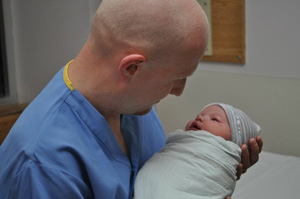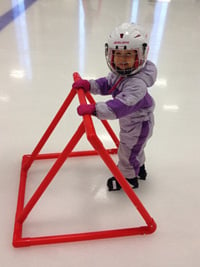How my daughter’s rare disease diagnosis saved my life
Summary:
SickKids parent Ian Stedman shares the story of his family's experience with a "one in a million" genetic disorder called Muckle-Wells Syndrome (MWS). Their doctor, Dr. Ronald Laxer, reflects on rare disease diagnosis for families like Ian's.
It may seem cliché to say this, but my life changed forever the day my daughter Lia was born. You see, Lia was born sick. Her mother and I didn’t realize it at first, but it became clear during her first year that something was not right. By the time Lia was eight months old, her body was nearly always covered in a rash. The rash moved, grew, faded and reappeared without any obvious triggers.

What makes Lia’s story somewhat unique is that her rash looked very similar to the rash I had struggled with for 32 years. Despite visiting many specialists throughout my life, I had never been properly diagnosed. The rash was so frequent that I simply covered my skin in order to avoid strange looks or questions. I even started to cover Lia up for that same reason.
Things worsened a few months before Lia turned two. For reasons we could not explain, she would not put weight down on her legs and she reverted back to crawling. After about a week, we ended up at the SickKids emergency room. We suspected arthritis because I had also been diagnosed with arthritis at a young age, but testing proved inconclusive. That visit to SickKids did however mark the start of a new journey for our family - our journey to diagnosis. That visit reminded me what it felt like to live my whole life not knowing what was wrong with me and it helped me appreciate that I did not want the same for my daughter. Suspecting that whatever was causing her rash must be genetic, I started to visit specialists again with the mindset that I would endure any test necessary if it could get us closer to a diagnosis for Lia.
As I met with specialists and explained our story, I was reminded that the rash was only one of my many reoccurring health problems. I also had fevers, headaches, arthritis, bloodshot and sore eyes, hearing loss, frequent cold sores and blood tests had revealed an elevated protein level in my liver that could not be explained. Could these symptoms be somehow related? If so, then why had Lia only experienced two of them? It was not until I started to ask these questions that my wife and I realized we needed to take Lia back to SickKids. This time we obtained a referral to rheumatology and that was when we met Dr. Ron Laxer.
By listening to our medical histories, Dr. Laxer was able to determine that Lia and I likely had a type of genetic disorder called Cryopyrin Associated Periodic Syndrome (CAPS). Genetic testing was completed for both of us in early 2014 and we were subsequently diagnosed with a “one in a million” genetic disorder called Muckle-Wells Syndrome (MWS), one of the forms of CAPS. We started treatment and every one of our painful symptoms disappeared immediately. Having treatment also means that Lia will not develop long-term damage such as hearing loss in the future, something that I unfortunately already have. More importantly, we now know that treatment prevents the mysterious protein from collecting in our bodies and causing organ damage. If left untreated, one in three people with Muckle-Wells Syndrome will not live to see their 35th birthday. So when I said earlier that having a daughter changed my life forever, I meant it. In fact, Lia being sick may actually have saved my life.

Almost two years have passed since we were diagnosed. Because Lia started treatment at such a young age, I now get to watch her play, dance, sing, jump, and just live her life without having to worry that her body might fail her. I don’t have to worry that a rash or blood-shot eyes will make her feel self-conscious or prevent her from trying new things. She does not have to live the life that I did. Lia can just be a normal kid.
As for me, I will be 35 this year. I hope that one day Lia is able to understand how much she has given me.
Diagnosing rare diseases in Canada: We should be up to the challenge
Dr. Ronald Laxer is the Staff Rheumatologist at SickKids, and Professor in the Department of Paediatrics and Medicine at the University of Toronto. He reflects on rare disease diagnosis in Canada.
Having practiced in an academic centre for over 30 years, I have witnessed how the remarkable advances in scientific discovery have led to the ability not only to diagnose, but to also treat diseases which had previously been fatal or severely impacted the quality of life of affected individuals and their family members. However, a significant number of patients with so-called “rare diseases” have not been nearly as fortunate. “Rare diseases” are defined as occurring in less than one per two-thousand of the population. There is an estimated 7,000 of such rare diseases, and they are thought to affect up to one in 12 Canadians. Most of these are genetic in origin, and many have their onset in childhood.
There are likely new “rare diseases” yet to be discovered. Ian Stedman clearly articulates some of the challenges faced by patients with rare disease in getting a diagnosis. In fact, despite visiting multiple excellent specialists and sub-specialists for 20 years, it was Mr. Stedman himself who made the diagnosis of his rare disease, which is thought to affect only about one in a million people. As a result of the delay in diagnosis, he was not appropriately treated (while effective treatments were available) and was at risk of developing severe, irreversible organ damage. How might this be addressed for other Canadians in similar situations?
It is impossible for primary-care practitioners to be aware of the incredibly large and diverse group of such diseases, but awareness of a constellation of signs and symptoms that do not fit a known pattern should trigger referral to appropriate consultant specialists and sub-specialists. Ideally the consultants would have close lines of communication, would be able to put their thoughts together and either make a diagnosis or come up with a plan for further investigation. But even in models such as this, a diagnosis may be elusive. A helpful resource could be a registry of Canadian physicians with expertise in rare diseases. This registry might assist patients and practitioners in at least knowing where to refer patients and where specific diagnostic testing might be available. A “made in Canada” website that describes the signs and symptoms of rare diseases and is easily searchable by health-care professionals as well as by patients could be linked to such a registry.
If a diagnosis is still not reached, I would like to suggest another model to consider. This would be a centre where patients with “undiagnosed” diseases could be referred and investigated comprehensively in a timely and cost-effective way. The centre would have strict referral guidelines and would do a thorough review of each case, reviewing the laboratory, X-ray and pathology results prior to seeing the patient. The centre would include a multi-disciplinary team of expert clinicians who have access to sophisticated diagnostic techniques and laboratory investigative tools. The centre would be linked with clinical and basic scientists who would undertake state of the art research testing to investigate those patients in whom a diagnosis still cannot be made. Several of my own patients have contributed to such discoveries which have had life-altering impacts – unfortunately they had to travel outside of Canada to have their diagnoses made.
Canadian clinicians and researchers are world-class. Big strides are already being taken. SickKids is part of a pan-Canadian research initiative called CARE for RARE which is led by Drs. Kym Boycott and Alex MacKenzie from the Children’s Hospital of Eastern Ontario (CHEO) and the University of Ottawa. The CARE for RARE initiative is focusing on the improvement of both the diagnosis and treatment of rare diseases and includes 21 academic sites across the country.
Patients with rare disease who are in search of a diagnosis should have the opportunity to access such expertise, no matter where they live.

